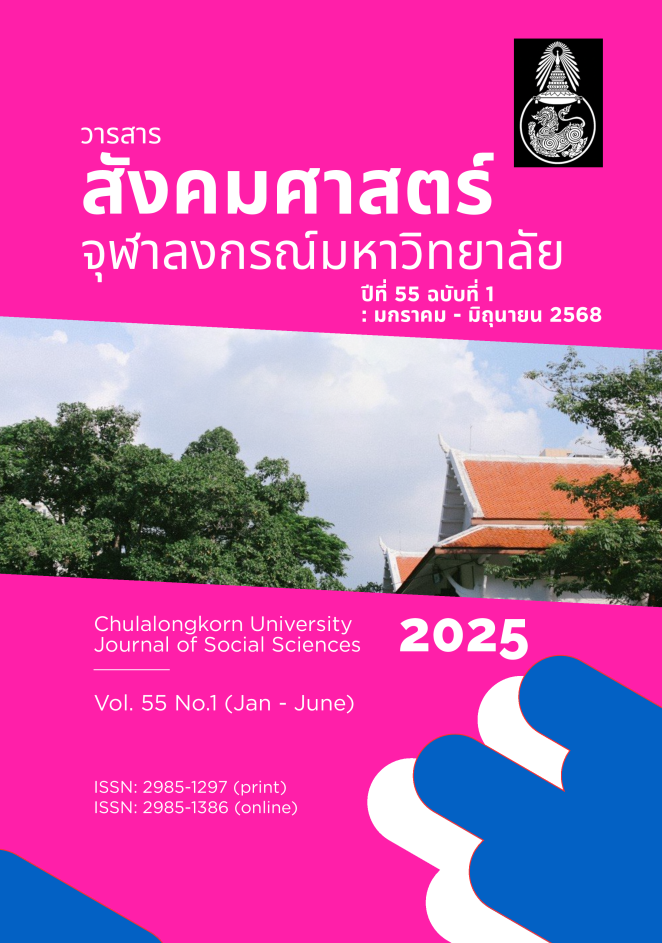Providing Welfare to Enhance Media Literacy and Promote Digital Justice for the Elderly
DOI:
https://doi.org/10.61462/cujss.v55i1.3969Keywords:
Welfare, Media Literacy, Digital Justice, ElderlyAbstract
Digital justice is a topic that has not been widely discussed in Thailand, despite being a key factor contributing to social inequality, particularly in terms of access to information, services, and basic social welfare that all citizens should rightfully receive. Social inequality is often framed primarily in terms of economic and societal disparities, with limited attention to “digital justice in media and technology.” This oversight indicates a gap in academic research, particularly in ensuring fair welfare for all, including the elderly, who are the focus of this article. This study seeks to expand perspectives on aging and challenge ageist stereotypes that portray older adults as resistant to technology. Findings from our research indicate a different reality: many elderly individuals actively acquire digital skills to stay informed and engaged in an evolving world. However, a portion of the elderly population still lacks digital proficiency, which limits their participation in society and restricts access to governmental information and services. This article outlines guidelines for welfare programs aimed at enhancing media literacy and promoting digital justice for the elderly, with objectives to reduce age discrimination, broaden social inclusion, and protect the rights of older adults in both the physical and virtual world. These issues are examined through the frameworks of social justice, digital justice, and digital human rights.
Downloads
References
Alexopoulou, Sofia, Joachim Åström, and Martin Karlsson. 2022. “The grey digital divide and welfare state regimes: A comparative study of European countries.” Information Technology & People 35 (8): 273–291. https://doi.org/10.1108/ITP-11-2020-0803.
Benjarat Sutjakul, Kosin Theswong, Benjaporn Pudsa, and Suteera Saenmontrikul. 2023. Research and Development of Active Ageing and the Elderly’s Roles on Using Social Media Safely, Creatively, and Knowledgeably. Bangkok: Thailand Science Research and Innovation. (in Thai)
Chatchai Muksong and Nopporn Malarak. 2024 “Digital Divide.” Accessed August 8, 2024. https://wiki.kpi.ac.th/index.php?title=ช่องว่างทางดิจิทัล_(Digital_Divide). (in Thai)
Faverio, Michelle. 2022. “Share of those 65 and older who are tech users has grown in the past decade.” Accessed January 13, 2022. https://www.pewresearch.org/shortreads/2022/01/13/share-of-those-65-and-older-who-are-tech-users-has-grown-in-the-past-decade.
Grizzle, Alton, Penny Moore, Michael Dezuanni, et al. 2014. Media and Information Literacy: Policy and Strategy Guidelines. Paris: UNESCO.
Montakarn Chimmamee, Chonticha Asavanirandorn, and Thananon Buathong. 2024. “Development and Enhancement of Work Skills among Thai Older Adults: Challenges and Future Policy Directions.” Aging Focus 1 (2): 8–11. https://thaitgri.org/?wpdmpro=aging-focus-จับตาสถานการณ์ผู้สูงอายุ. (in Thai)
National Statistical Office. 2022. “The 2022 Household Survey on the Use of Information and Communication Technology (Quarter 2).” Accessed November 10, 2024.https://www.nso.go.th/nsoweb/storage/survey_detail/2023/20230430130946_84978.pdf. (in Thai)
National Statistical Office. 2023. Summary of Important Results: Survey on the Use of Information and Communication Technology in Households 2023. Ministry of Digital Economy and Society.https://www.nso.go.th/nsoweb/storage/survey_detail/2024/20240426085831_43202.pdf. (in Thai)
Niran Jongwutthiwet. 2007. Community Development Concepts. Bangkok: Ruam Thai Press. Community Development Department, Ministry of Interior. (in Thai)
Office of the National Digital Economy and Society Commission. 2019. “National Policy and Plan on Digital Development for the Economy and Society (2018–2037).” Accessed November 10, 2024.https://onde.go.th/assets/portals/1/files/620425-Government%20Gazette.PDF. (in Thai)
Prins, Corien. 2018. “Digital justice.” Computer Law & Security Review 34 (4): 920–923. https://doi.org/10.1016/j.clsr.2018.05.024.
Schafer, Stephen. 1977. Victimology: The Victim and His Criminal. Reston Publishing Company.
Van Dijk, Jan. 2005. The Deepening Divide: Inequality in the Information Society. Thousand Oaks, CA: SAGE Publications. https://doi.org/10.4135/9781452229812.
Van Dijk, Jan. 2020. “The Digital Divide.” Journal of the Association for Information Science and Technology 72 (1): 136–138. https://doi.org/10.1002/asi.24355.
World Economic Forum. 2021. “Pathways to Digital Justice.” Accessed August 28, 2024. https://www3.weforum.org/docs/WEF_Pathways_to_Digital_Justice_2021.pdf.
World Economic Forum. 2023. “Future of Jobs Report 2023.” Accessed September 2, 2024. https://www3.weforum.org/docs/WEF_Future_of_Jobs_2023.pdf.
Downloads
Published
How to Cite
Issue
Section
License
Copyright (c) 2025 Faculty of Political Science, Chulalongkorn University

This work is licensed under a Creative Commons Attribution-NonCommercial-NoDerivatives 4.0 International License.
Public Licensing Terms
Copyright and Licensing Policy
The Chulalongkorn University Journal of Social Science publishes all content under the Creative Commons Attribution-NonCommercial-NoDerivatives 4.0 International License (CC BY-NC-ND 4.0).
Copyright
All published articles in the Chulalongkorn University Journal of Social Science are the copyright of the Faculty of Political Science, Chulalongkorn University. Authors transfer all rights to the journal upon acceptance of their manuscript for publication.
CC BY-NC-ND 4.0 License
Under this license:
-
Attribution (BY): Users must give appropriate credit to the authors, the Faculty of Political Science, Chulalongkorn University, and the Chulalongkorn University Journal of Social Science, provide a link to the license, and indicate if changes were made. They may do so in any reasonable manner, but not in any way that suggests the licensor endorses them or their use.
-
NonCommercial (NC): Users may not use the material for commercial purposes. Commercial use requires prior written permission from both the authors and the Faculty of Political Science, Chulalongkorn University.
-
NoDerivatives (ND): If users remix, transform, or build upon the material, they may not distribute the modified material. Adaptations of the work require prior written permission from both the authors and the Faculty of Political Science, Chulalongkorn University.
Open Access Statement
The Chulalongkorn University Journal of Social Science provides immediate open access to its content on the principle that making research freely available to the public supports a greater global exchange of knowledge. Users are allowed to read, download, copy, distribute, print, search, or link to the full texts of the articles without asking prior permission from the publisher or the author, in accordance with the CC BY-NC-ND 4.0 license.
Self-Archiving Policy
Authors may archive the final published version, preprints, or postprints of their articles in institutional repositories or on their personal websites, provided that they acknowledge the original publication in the Chulalongkorn University Journal of Social Science with a complete citation and a link to the journal's website.
Permissions
For any use beyond those covered by the CC BY-NC-ND 4.0 license, please contact:
Editorial Office
Chulalongkorn University Journal of Social Science
Faculty of Political Science, Chulalongkorn University
Email: cusocscij@gmail.com
For more information about the Creative Commons Attribution-NonCommercial-NoDerivatives 4.0 International License, please visit: https://creativecommons.org/licenses/by-nc-nd/4.0/





